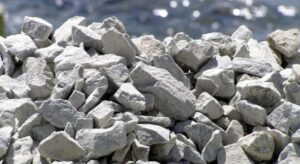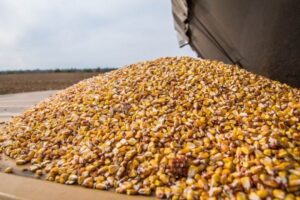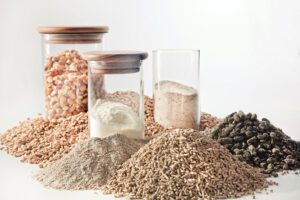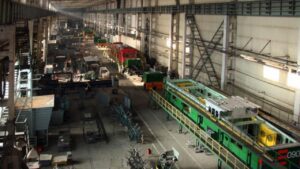
The investment company BGV Group Management has launched a new plant for the production of crushed stone products in the Zhytomyr region, investments in construction amounted to $22 million.
“Our company BGV Group Management has officially launched a state-of-the-art crushed stone plant. Fully automated, with the latest technological Swedish SANDVIK equipment, mining equipment and infrastructure built from scratch. We did all this literally in the forest, greenfield and during a full-scale war in the country,” said member of the board of directors of the investment company Sergei Voitsekhovsky.
According to him, the production capacity of the plant is 1.5 million tons of rock mass per year. Granite Quarry LLC operates on the basis of the Zherevsky deposit with an area of 63.2 hectares, the reserves of which amount to 46 million cubic meters of rock.
The opening of the plant will create 200 new jobs in the region, Voitsekhovsky emphasized.
BGV Group Management is an investment company of Gennady Butkevich, developing businesses and projects in the mining, processing, energy efficiency, retail and development sectors.

The Eurocar plant (Solomonovo, Zakarpattia region) will resume the SKD assembly of Skoda cars from June 10, which was suspended with the start of Russia’s military aggression in Ukraine, the company’s press service reports.
“Skoda AUTO resumes deliveries of Skoda cars to Ukraine in the SKD format. The first batch – 80 models of KODIAQ and KAROQ crossovers has already been shipped, and from June 10 the plant resumes operation,” the company’s Facebook page says.
The company notes that the growth in production will directly depend on the development of the war in Ukraine. The vacant premises of the plant will continue to serve as a center for temporary displaced persons.
The message reminds that SKD assembly (Semi Knocked Down) means that the power unit (engine, gearbox, front axle), rear axle, wheels, exhaust, and driveshaft for 4×4 models are dismantled from finished cars. The main components, together with the body, are sent for reassembly to a factory in Ukraine.
The company also reminds that a stable supply of original spare parts, accessories and engine oils to Skoda service centers in Ukraine has already been established.
The Eurocar plant, which is part of the Atoll Holding group of companies, the official manufacturer of Skoda cars in Ukraine, began producing cars in 2001, investments in its creation amounted to $ 250 million. Capacities for small-scale assembly of cars were created, buildings for welding and painting shops were built.

The Austrian-based Head Group has received permission from the State Inspectorate for Architecture and Urban Planning of Ukraine to start the construction of the Head Vinnytsia plant on the territory of the Winter Sport industrial park, Andriy Ocheretny, the deputy mayor of Vinnytsia, said on Facebook.
“The completion of construction of the plant and commissioning of production facilities is scheduled for December 2022. The company plans to invest about EUR80 million in the creation of production, administrative and storage facilities,” he said.
The deputy mayor clarified that since May 12, 2021, preparatory work on the land plot continued at the site: more than 100,000 cubic meters of fertile soil layer were removed, reinforced concrete supports were installed for laying a cable power line, temporary connection networks from the substation were installed.
According to the project, the building of the plant will consist of production and storage facilities, an administrative building, a sewing workshop. The production building will house workshops for the manufacture of skis, boots and bindings, as well as warehouses for raw materials and finished products.
The total area of production premises after the commissioning of the enterprise in 2023 will be 43,000 square meters.
Ocheretny noted that, as expected, this plant will be one of the largest Head Group plants in the world and will provide jobs for more than 1,200 residents of Vinnytsia.
As reported, the total area of the Winter Sport industrial park is 25 hectares. The start of construction of the plant took place in May 2021.
Head International Holding GmbH manufactures sports equipment for winter sports, tennis and scuba diving. The company’s production facilities are located in Austria, the Czech Republic, Bulgaria, China. The company is present in 85 countries around the world.

Seed Corp (Cherkasy), the Ukrainian division of the American company Remington Seeds, on September 15 launched the first stage of a corn seed production plant in the village of Helmiaziv (Cherkasy region), a project worth $ 30 million and a capacity of 2.2 MW was connected to the power grid in a short time – in two months, according to the website of PJSC Cherkasyoblenergo.
“For the first time in my practice, a contract was signed, and exactly two months later, as they say, on a day-to-day basis, the 2.2 MW plant was connected to electricity. This was the result of a lot of joint work, when any approvals were carried out quickly and efficiently,” co-founder of Seed Corp Serhiy Tereschuk said.
According to the data of Cherkasyoblenergo, the construction of the first stage of production lasted 3.5 months. To provide the plant with raw materials, Seed Corp uses 3,960 hectares of irrigated land, and the company also purchased more than 20 units of special equipment for crop production. About 150 people were employed at the enterprise.
During the opening of the plant, Deputy Minister of Agrarian Policy and Food Taras Dzioba noted a favorable investment climate in Cherkasy region, as investors increasingly choose Cherkasy region to open their enterprises.
“Such events really inspire me more than the opening of grain terminals. This is much more important because it makes it possible to increase supply chains, increase added value in the Ukrainian agricultural sector. This is exactly what we must work on,” the official said.
Cherkasyoblenergo specified that about 20 organizations were involved in the construction of the first stage of the project.

The Koudijs Group of Companies (Koudijs, the Netherlands, a subsidiary of the Dutch Royal De Heus) has launched a plant for manufacturing mineral and vitamin supplements for agricultural animals in the village of Khylchytsi (Lviv region) with an estimated production capacity of 1,500 tonnes of finished products per month, investments in the project amounted to EUR 7.8 million, according to a posting of the website of the Ministry of Agricultural Policy and Food.
“The new plant is eight floors of new specialized equipment from the world’s leading companies, automated control systems, an automatic packaging line and robotic technology,” the ministry said.
According to the ministry, the new plant in Ukraine is part of the Koudijs group of companies – an international producer of animal feed, concentrates and premixes, which has more than 90 plants in 60 countries of the world.
The Ukrainian branch of Koudijs Ukraine LLC, in 2020, increased its net profit 1.4 times compared to 2019, to UAH 38.46 million, revenue 1.6 times, to UAH 593 million.
According to the unified public register of legal entities and sole proprietors, the ultimate beneficiaries of Koudijs Ukraine LLC are Hendrik Anthony de Hois (the Netherlands, owns 51% in the charter capital of the company) and Fedir Shopsky (49%).
The company’s website states that the plant’s capacity at the level of 1,500 tonnes of finished products is able to fully meet the needs of Ukrainian livestock and poultry farms. The enterprise will produce mineral and vitamin supplements for the domestic market, but they also could be exported in the future.
“In order for the economy in the state to develop, the authorities must create the necessary conditions for this. Today, we are building roads, improving infrastructure, building schools and sports grounds and opening new powerful enterprises. For example, yesterday, the first innovative seed-breeding center in Western Ukraine was launched in the region, and today we are opening a modern plant for the production of feed,” the Ministry of Agrarian Policy said, citing Head of the Lviv Regional State Administration Maksym Kozytsky.

The Cabinet of Ministers of Ukraine has transferred Dnipro Electric Locomotive Plant to the list of objects of big privatization from objects of small privatization, which means sale at a tender with conditions.
The corresponding order on the plan to sell 100% of the plant shares was adopted by the government at a meeting on September 15.
An explanatory note to the draft resolution states that the value of the company’s assets at the end of 2020 was UAH 420.3 million, while small privatization objects have assets of up to UAH 250 million.
The plant in 2018-2019 was included in the list of objects of small privatization, but the sale did not take place. In August 2020, the government agreed on the transformation of the state enterprise Dnipro Electric Locomotive Plant into a joint-stock company, and the corresponding changes were registered in March 2021.
Dnipro Electric Locomotive Plant specializes in the production of main-line electric locomotives of direct and alternating current, industrial electric locomotives for opencast mining of minerals, as well as mine contact electric locomotives for mining and coal industries.
According to information in the SPARK system, the plant’s net loss in 2020 increased by 18.8% – to UAH 78.5 million, and revenue fell to UAH 4,000 from UAH 35.6 million a year earlier.